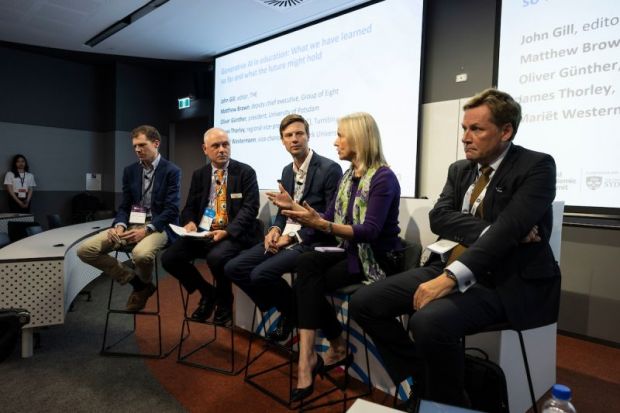Universities should face up to the fact that ChatGPT and other generative AI will be “undetectable” and “get out of the plagiarism rut”, instead realising that teaching students how to use those AI tools will be core to the future of higher education, two university leaders have urged.
A session at the Times Higher Education World Academic Summit looked at “what the future might hold” on generative AI in higher education.
Oliver Günther, president of the University of Potsdam, told the event it was true to say that “many of our colleagues are underestimating how AI is going to change teaching and research and administration”.
For example, “the way we address fraud both in research and teaching has to be changed, because using these tools is not fraud – it’s just a question of how you combine it with your intellectual contribution”, he said.
The fact of “text generation becoming a commodity…that’s something that will change the way, the fields, that we teach our students,” he continued. “It’s not forbidden to use ChatGPT – we have to teach our students how to use it productively in their relevant [disciplinary] contexts.”
Mariët Westermann, vice-chancellor of New York University’s Abu Dhabi campus, said the pace of change had brought a “supercharging of the potentials of generative AI directly at the heart of the university, in the classroom and, to some degree, in the lab, the library”.
“I think what this tells us is this leap is going to transform, is going to have to transform, our institutions and our model of higher education,” she added.
A study by NYU Abu Dhabi researchers of the “academic reality” of ChatGPT use in universities, published in Scientific Reports, had included a survey of student attitudes to the technology across a range of countries.
This showed a “bifurcation” of attitudes between students and academics, Professor Westermann said.
Students saw the implications of generative AI for academic integrity as an issue for universities to deal with, instead taking the attitude of “help me do it [using generative AI] better so I’m prepared for the workforce and for life”.
Turnitin’s AI detector was “still not reliable”, she added.
James Thorley, Turnitin’s regional vice-president for the Asia-Pacific, joked that it had been “a very busy year” for the company since the emergence of ChatGPT.
The speed of technology adoption had been “staggering”, he added.
While there was already a shift away from summative assessment, the advent of generative AI “really accelerates the process – I think you have to do much more assessment for learning, really keep focusing on the process of learning,” he said.
Mr Thorley continued: “I can’t see a world in a few years’ time where someone sets off and wants to write 30,000 words unaided.”
He added of the impacts for universities: “There is going to be a core focus on how to teach writing, how to teach the basics, what is good writing or not. Because what we don’t want is students not being able to effectively analyse and evaluate the outputs of generative AI.”
Professor Westermann said universities “need to get out of what I call the plagiarism rut – we need to think about what we can do, not what we cannot do”.
She added: “I want to thank James [Thorley] for saying it’s undetectable to some degree, so admitting that this is hard.”
A Turnitin spokeswoman said subsequently: "We’d like to clarify that James Thorley’s comment was made strictly in regards to AI generated images, and not text."
On the views of academics, Professor Westermann said: “My faculty is no different from faculty in other universities: most of the faculty are extremely worried about all their traditional skill set falling away…and having so much more work to do, because they are so worried about the test and the assignment no longer being the assessments of choice.”
Professor Günther said that “for us in higher education, it’s going to be…a fairly difficult transition phase”, because of “inertia” from staff.
As university leaders, “our job is not to make life easy for our fellow faculty”, he continued. “Our job is to prepare these people, young or old…to acquire new skills, to become more creative.”
“Teaching ‘prompt engineering’ [how to best communicate with generative AI] is going to be part of what we are doing,” he added.
Register to continue
Why register?
- Registration is free and only takes a moment
- Once registered, you can read 3 articles a month
- Sign up for our newsletter
Subscribe
Or subscribe for unlimited access to:
- Unlimited access to news, views, insights & reviews
- Digital editions
- Digital access to THE’s university and college rankings analysis
Already registered or a current subscriber? Login








